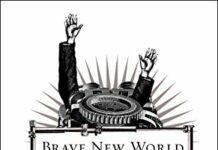
Ebook Info
- Published: 2014
- Number of pages: 544 pages
- Format: PDF
- File Size: 1.50 MB
- Authors: Aldous Huxley
Description
A varied and emotionally complex cast of characters interact with one another and the broader society in Britain in the 1920s, their experiences exploring themes of modern living, morality, and humanity. Point Counter Point reflects many of the same sentiments about the perils of modern life as Aldous Huxley’s later novel Brave New World, but presents these ideas in a more subtle and intricate fashion. Often considered Huxley’s masterpiece, Point Counter Point was the author’s longest and most complex work, and many of the main characters are thought to be influenced by contemporary public figures such as D.H. Lawrence and Sir Oswald Mosley.HarperPerennial Classics brings great works of literature to life in digital format, upholding the highest standards in ebook production and celebrating reading in all its forms. Look for more titles in the HarperPerennial Classics collection to build your digital library.
User’s Reviews
Reviews from Amazon users which were colected at the time this book was published on the website:
⭐there are 20 pages missing in the book…
⭐Very nteresting novel by a highly knowledgeable intelectual. “Modern readers” will find it outdated and probably will drop it, but still it’s achallenge
⭐Decent book, just not the best by Huxley
⭐I AM READING IT NOW. IT IS JUST WHAT YOU SAID IT WOULD BE. ALDUS HUXLEY WAS A VERY FINE WRITER. THIS WAS ONEOF HIS BEST BOOKS.
⭐Very nice copy, with a cover! Thanks.
⭐compelling Huxley
⭐If the measure of a novel is how often it gets you to say to yourself “My heavens, I have thought exactly the same thing!” then the two highest scoring novels I have ever read are “The Brothers Karamazov” and “Point Counter-Point.” Huxley’s insight into the variety of human thought processes, motivations, and psychologies is downright impressive. And his skill at taking you down one psychological path and then, just when he has gotten you — sometimes tricked you — into agreeing with him, to do a U-turn and take you down the very opposite path, is masterful. And if you like “meta,” you will love this book, which is meta on many levels, one of the most obvious of which is the fact that the book itself is being written by one of the characters in the book. Fantastic writing — even the occasional little scientific details are wonderful. My only complaint is the last forty or so pages, in which Huxley basically goes off the rails and has lots of bad things happen to a lot of people for no very good (to me) reason. And why he ended with Burlap is a complete mystery. But those are minor flaws. If you like really, really well written novels, read this one, which is not as well known as it should be.
⭐I read this when I was in my twenties some 40 years ago and it was one of the few books I’ve finished and then gone right back to the beginning to read all over again. Not so now: perhaps age has jaded me or rendered me impatient and I found some of the passages where characters endlessly discuss their high fallutin’ ideas yawn provokingly tedious, being glad to limp to the end. One can imagine the author himself pondering life’s great conundra with idle friends from the leisured classes and no doubt being excited by the ideas that emerged; I just thought it a bit immature to transpose them in interminable and inconclusive chunks into a book, interrupting an already rather slim narrative.However, as an eye opener onto how said leisured classes indulged themselves (apart from spouting monologues) this book is a matchless piece of social history. With very few exceptions the characters are selfish, repressed and cruel, displaying a sense of entitlement which might well have been quite common among the unthinking upper classes in the 1920s but takes one’s breath away today.Some good laughs to be had, as well. Comparisons with Waugh are almost inevitable, but the all permeating bleakness in Huxley induces a sense of despair and frustration. An insightful, sometimes masterful, but not very comfortable read.
⭐Like many novels about the ‘bright young (or in this case not so young) things’ of the inter-war years this is dull and irrelevant. It has little to say about its contemporary society and nothing to modern readers. It is almost unbelievable that the writer who produced ‘Brave New World’, one of the great 20th century novels could produce this dross.
⭐This is my favourite Huxley novel – the dialogue in it is sparkling – glad to have a copy back with me. Good service.
⭐As expected
⭐Huxley stellt in seinem Roman von 1928 eine Anzahl von verschiedenen Charakteren gegeneinander, die sich im Laufe der Geschichte begegnen und deren Grundeinstellungen miteinander harmonieren und kollidieren. Die Züge der Akteure sind detailliert herausgearbeitet und gleichzeitig zugespitzt dargestellt, um Idee und Typus des jeweiligen Akteurs zu verdeutlichen und diese in Gegensatz zum anderen Achsenpol der Dimension zu setzen.Huxley gibt ein breites Abbild von verschiedenen charakterlichen Typen ab, die eine Gesellschaft formen. Da die Emotionen und Antriebe der Menschen sich nicht ändern, gibt das Buch auch nach 90 Jahren noch wundersame Einblicke in die psychologischen Grundmuster von Akteuren, denen wir auch heute ständig begegnen.Das Buch sollte zügig gelesen werden, da die Vielzahl der auftauchenden Charaktere es erschwert, sich nach einer Pause wieder einzufinden.
⭐
Keywords
Free Download Point Counter Point in PDF format
Point Counter Point PDF Free Download
Download Point Counter Point 2014 PDF Free
Point Counter Point 2014 PDF Free Download
Download Point Counter Point PDF
Free Download Ebook Point Counter Point

